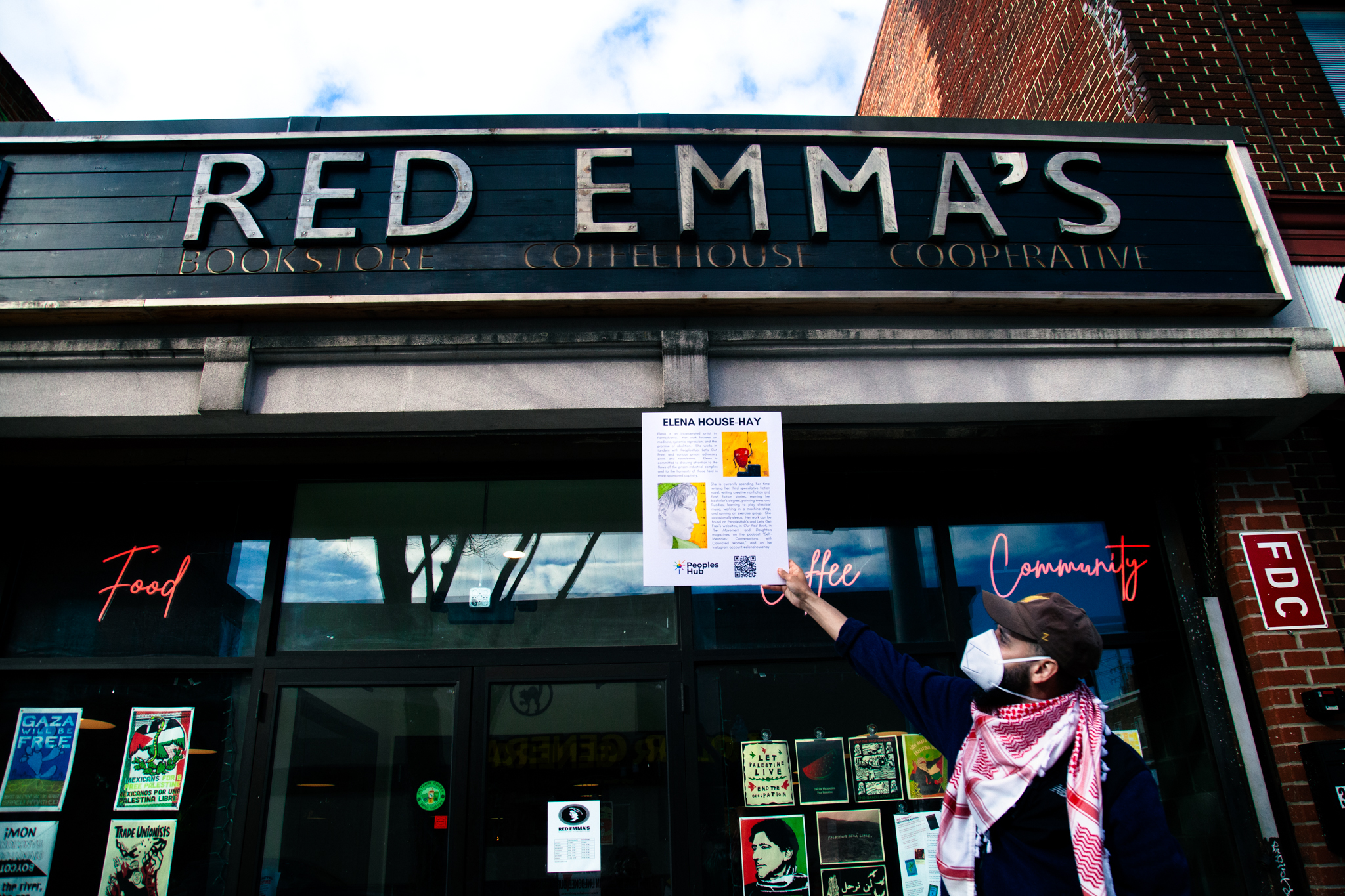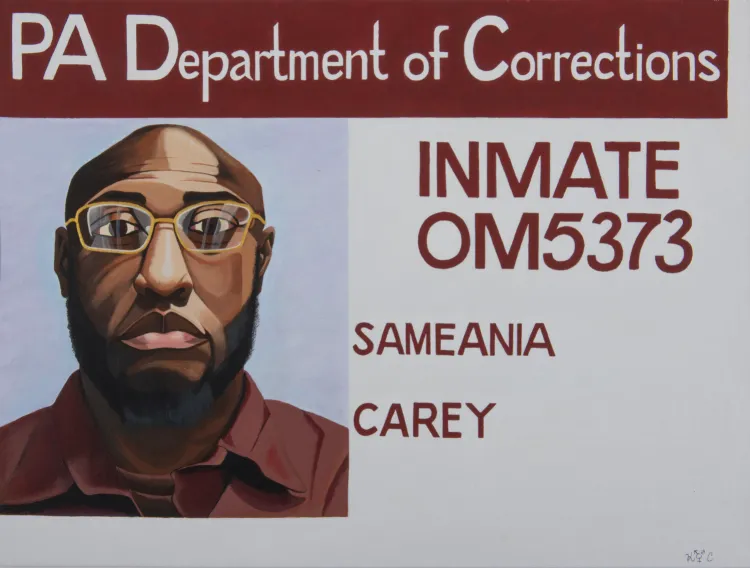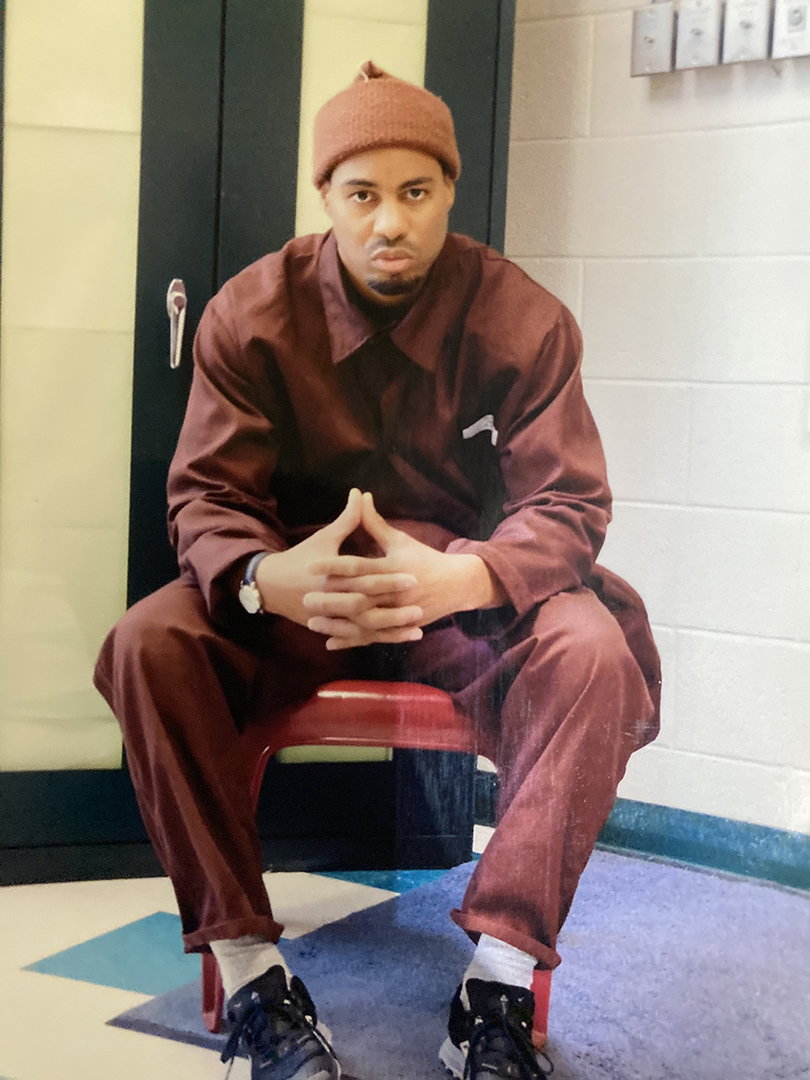Arts and Social Justice Fellowship
This project brings together a cohort of organizers to collaborate with incarcerated artists in a shared study and creative process. Skip to past fellows section:
Past Fellows
Work by Elena House-Hay.
Brief History
The Arts and Social Justice Fellowship launched in 2022 to provide support, resources, and political education to cultural workers — without the expectation of production. At the time, the movements we were connected with were engaged in a battle of ideas, and we saw cultural organizing as a vital strategy for building skills and strengthening those efforts. The fellowship was also part of a broader commitment to help artists find a home within movements and root their work in the long lineage of cultural organizing.
The initial eight-month cohort included four artists from across the U.S., one of whom was incarcerated. Together with staff from PeoplesHub, the artists met monthly to build relationships and study cultural organizing methods and strategies. The goals were to weave cultural work into online organizing practices, foster collaboration among artists, and develop skills in popular education. The program continued into 2023 with a second cohort, again including an incarcerated artist. Each fellow deepened their existing practice or created new work based on the collective study, and participated in public programs to share their stories — creating rare opportunities for incarcerated artists to engage with broader audiences.
In 2024, we redesigned the fellowship to focus exclusively on supporting incarcerated artists. This shift was grounded in our experience: the most profound levels of engagement, mutual learning, and transformation had come through working with artists inside. At a time when prison policies were increasingly restrictive and isolating, the fellowship became a powerful way to build and sustain community across prison walls.
The structure evolved from a theory-based study group into an active practice of navigating prison communication barriers to collaborate on work that reflects lived conditions inside and out. The incarcerated artist worked alongside three outside organizers over a five-month period, meeting regularly to share reflections, exchange feedback, and build solidarity.
Running a program like this across prison walls demands constant creativity and adaptability. But it has revealed what's possible when we challenge the limits of confinement. This work has stretched our imagination for how incarcerated artists can participate in movements — and how virtual space can be a site of connection, collaboration, and resistance.
Overview
The Arts and Social Justice Fellowship brings together a cohort of outside organizers to collaborate with incarcerated artists in a shared study and creative process. Together, they explore the principles of disability justice and the solidarity economy, integrating these frameworks into artistic practice. The fellowship is designed to cultivate relationships and strategies that enable effective collaboration across prison walls, while offering space to engage with structure, support, and grounding.
Over several months, the cohort meets regularly to engage with readings and discussions focused on incarceration, disability justice, and the solidarity economy. Incarcerated artists receive material support to create new work that responds to these themes and reflects the collaborative study process. The fellowship culminates in a public engagement that features the artist and their work, creating opportunities for broader dialogue.
This program bridges theory and practice — connecting radical frameworks to the lived experiences and cultural practices within prisons. By supporting this exchange, the fellowship aims to strengthen existing forms of resistance and care inside, while informing how these lessons can be applied beyond prison walls.
Past Incarcerated Fellows and Program Advisors
Elena House-Hay

Elena is an incarcerated artist in Pennsylvania. Her work focuses on madness, systemic repression, and the promise of abolition. She works in tandem with PeoplesHub, Let's Get Free, and various prison advocacy zines and newsletters. Elena is committed to drawing attention to the flaws of the prison-industrial complex and to the humanity of those held in state-sponsored captivity.
Kal-El Carey

My name is Kal-El Carey. I am an African American Trans-male who is currently incarcerated in a Pennsylvania women's state prison. I have trademarked my own brand and artistic style called, "Z-Coded." Z-coded is a medical and/or mental health prison code that describes an inmate which the state deems too dangerous or mentally unstable to be housed with any other state prisoner for their or another's safety. To those incarcerated, it's just another oppressive mechanism used by the DOC to silence those within the system believed to be different from what their version of society labels as "normal." Basically, Z-coding is taking something normalized and making it different. My purpose in my art is to show that different is also beautiful.
William "Yem" Case

Yem, currently incarcerated in a PA state prison, is an organizer, social justice activist, and writer. He is active in the fight to address the myriad of issues surrounding inequality and racism, with hopes of creating an egalitarian society. He has written many essays and articles focused on the importance of knowing history and the irreparable damage caused by hatred and xenophobia. He has also worked (despite a lack of support from the administration) to design institutional programs and organizations for the benefit of the prison's youth and aging/geriatric community, including The Golden Ages and The Olive Branch Association.
Past Fellows
Miguel Lopez
Miguel Lopez is a multimedia artist born and raised in Mexico. Through the use of painting, silk-screening, relief printing, and street art, he uses art as a tool to create dialog about different issues impacting his community. He is also a community organizer in the immigrant rights movement and currently resides in the southwest side of Chicago.
Saleem Hue Penny
Saleem Hue Penny is a Black "rural hip-hop blues" poet, arts educator, and mutual aid advocate with Lowcountry roots, single-sided deafness, and Ramsay Hunt Syndrome. The 2021 Poetry Coalition Fellow at Zoeglossia, an Assistant Poetry Editor at Bellevue Literary Review, and a proud Cave Canem Fellow, Saleem's writing explores how young people of color traverse wild spaces and define freedom on their own terms. He often punctuates his poetry with drum loops, gouache, and birch bark.
Taria Person
Taria Person is an alum of the University of Tennessee in Knoxville, where they received a dual B.A. in English Creative Writing: Poetry, and Interdisciplinary Studies: Africana Studies. Person is the author of Rainbow Elephant, and was commissioned to write a book of poetry by the Emily Hall Tremaine Foundation entitled, At the Summit. Person won an Artistic Professional Development grant from Alternate ROOTS in 2018 to produce their original lgbt stage play, Hangers, won an artistic grant in 2020 to produce their hip hop folk tale, Storm, has won multiple 1st place regional Spoken Word and Hip-Hop Slam Championship titles (2012 - 2017), performed at the Bonnaroo Music and Arts Festival (2019), produced and performed Hangers at the Arkansas Theatre Festival (2020), as well as performed with Knoxville Symphony Orchestra and The 5th Woman Poetry for Vivaldi's Four Seasons (2021). Taria Person is an annual Young Writers' Workshop instructor for Humanities TN, works as a teaching artist for Turnip Green Creative Reuse, and is the Write with Pride Coordinator for Southern Word.
